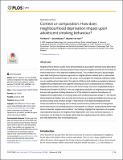Files in this item
Context or composition : how does neighbourhood deprivation impact upon adolescent smoking behaviour?
Item metadata
| dc.contributor.author | Morris, Tim | |
| dc.contributor.author | Manley, David | |
| dc.contributor.author | van Ham, Maarten | |
| dc.date.accessioned | 2018-02-09T12:30:08Z | |
| dc.date.available | 2018-02-09T12:30:08Z | |
| dc.date.issued | 2018-02-08 | |
| dc.identifier.citation | Morris , T , Manley , D & van Ham , M 2018 , ' Context or composition : how does neighbourhood deprivation impact upon adolescent smoking behaviour? ' , PLoS One , vol. 13 , no. 2 , e0192566 . https://doi.org/10.1371/journal.pone.0192566 | en |
| dc.identifier.issn | 1932-6203 | |
| dc.identifier.other | PURE: 252214754 | |
| dc.identifier.other | PURE UUID: 9d063cbc-8ac5-4527-a4b4-27692323c414 | |
| dc.identifier.other | RIS: urn:3E208AA3F4CFB3AD25C01CA04F261534 | |
| dc.identifier.other | Scopus: 85041725643 | |
| dc.identifier.other | WOS: 000424517900096 | |
| dc.identifier.other | ORCID: /0000-0002-2106-0702/work/64697580 | |
| dc.identifier.uri | https://hdl.handle.net/10023/12697 | |
| dc.description | TM is funded by an Economic and Social Research Council PhD studentship in Advanced Quantitative Methods (ES/J50015X/1). DM and MvH are supported by a European Research Council grant under the European Union's Seventh Framework Programme (FP/2007-2013) Agreement n.615159 (ERC Consolidator Grant DEPRIVEDHOODS, Socio-spatial inequality, deprived neighbourhoods, and neighbourhood effects). The UK Medical Research Council and the Wellcome Trust (Grant ref: 102215/2/13/2) and the University of Bristol provide core support for ALSPAC. | en |
| dc.description.abstract | Neighbourhood effects studies have demonstrated an association between area deprivation and smoking behaviour whereby people living in deprived neighbourhoods are more likely to smoke than those in non-deprived neighbourhoods. This evidence though is based largely upon data that ignores long term exposures to neighbourhood contexts and is confounded by neighbourhood selection bias. In this study, we investigate the temporal ordering of exposure to neighbourhood deprivation throughout childhood and whether associations between neighbourhood deprivation and cigarette smoking are due to compositional or contextual neighbourhood effects. Data come from a UK cohort study, the Avon Longitudinal Study of Parents and Children (ALSPAC). We use longitudinal measures of neighbourhood deprivation and self-reported smoking behaviour for 2744 children to examine the influence of neighbourhood deprivation on smoking status and smoking heaviness at age 17. Our results demonstrate that children who are born into and grow up in deprived neighbourhoods are up to twice as likely to be smokers at age 17 than those in non-deprived neighbourhoods. These associations are largely due to family socioeconomic position and the intergenerational transmission of smoking behaviour from parents to children; compositional rather than direct contextual ‘neighbourhood effects’. Our findings highlight the importance of considering longitudinal exposure to neighbourhood deprivation over cross sectional exposure. In conclusion, we find that it is the family rather than the neighbourhood into which a child is born that determines their smoking behaviour. | |
| dc.format.extent | 16 | |
| dc.language.iso | eng | |
| dc.relation.ispartof | PLoS One | en |
| dc.rights | © 2018 Morris et al. This is an open access article distributed under the terms of the Creative Commons Attribution License, which permits unrestricted use, distribution, and reproduction in any medium, provided the original author and source are credited. | en |
| dc.subject | H Social Sciences (General) | en |
| dc.subject | HM Sociology | en |
| dc.subject | HT Communities. Classes. Races | en |
| dc.subject | GF Human ecology. Anthropogeography | en |
| dc.subject | E-DAS | en |
| dc.subject.lcc | H1 | en |
| dc.subject.lcc | HM | en |
| dc.subject.lcc | HT | en |
| dc.subject.lcc | GF | en |
| dc.title | Context or composition : how does neighbourhood deprivation impact upon adolescent smoking behaviour? | en |
| dc.type | Journal article | en |
| dc.contributor.sponsor | European Research Council | en |
| dc.description.version | Publisher PDF | en |
| dc.contributor.institution | University of St Andrews. School of Geography & Sustainable Development | en |
| dc.identifier.doi | https://doi.org/10.1371/journal.pone.0192566 | |
| dc.description.status | Peer reviewed | en |
| dc.identifier.grantnumber | ERC-2013-CoG | en |
This item appears in the following Collection(s)
Items in the St Andrews Research Repository are protected by copyright, with all rights reserved, unless otherwise indicated.

